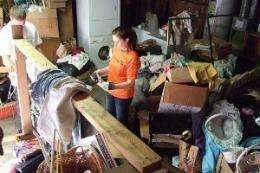Hoarders lack decision-making capacity, study finds

Compulsive hoarders struggle to throw out their many possessions because their brains lack flexibility, new research suggests.
To most people, the idea of clogging your home with myriad useless items is baffling.
Some compulsive hoarders have bankrupted themselves with self-storage bills, and many sufferers have driven their exasperated spouses to divorce.
But psychologists at Curtin University now think the problem may be down to a chronic case of putting things in the 'too-hard' basket.
The researchers probed the decision-making capabilities of 24 compulsive hoarders, and discovered that they score significantly lower on mental flexibility than non-hoarders.
"People who hoard appear to have some difficulties with sustaining attention and in certain aspects of decision-making," says clinical psychologist A/Prof Clare Rees, a member of the research team.
In practice, this means hoarders tend to generate too many possible categories for their possessions, she says.
For instance, faced with an old jacket that no longer fits, a compulsive hoarder might struggle to decide whether to take it to the op shop, get it tailored, give it to a friend, sell it online, keep it until they lose weight, or just chuck it away.
"What tends to happen is that they then feel overwhelmed and it simply gets thrown back into a box in the corner for another five years," A/Prof Rees says.
She says she and her colleagues had no trouble finding their 24 subjects for the study – they simply put out an advert on local radio and volunteers came forward.
They gave them a task called the Wisconsin Card Sorting Test, which tests subjects' organisational skills by requiring them to arrange differently patterned cards into categories.
Compulsive hoarders had trouble adapting their scheme as things got more complex, and also struggled to maintain their focus on the task, the researchers report in the journal Behavioural and Cognitive Psychotherapy.
The results suggest that curing compulsive hoarders of their tendencies is more complex than just teaching them to throw stuff away.
The most common treatment involves encouraging hoarders to sort through their possessions, making a quick decision over the fate of each one. In theory, they eventually learn that the pain of dispensing with an item is only fleeting.
But the problem may be more deep-seated than that, says A/Prof Rees.
"Rather than simply focusing treatment on reducing the number of possessions in their home, we should be thinking about helping them modify or train certain aspects of their cognitive abilities. Perhaps the most important aspect of this would be to train them in developing mental flexibility and attention."
But there's another hurdle – before they can be treated, many compulsive hoarders first have to admit there's something wrong.
"Many people with this problem are not highly motivated to change because some of them don't see a problem with their behaviour," A/Prof Rees says.
"It's usually others that get upset, such as family or the local council because of the mess it creates."

















